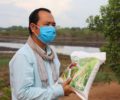Ratanakiri Zero-Snaring Campaign

Joint Media Release:
End the snaring crisis and trade in all kinds of wildlife in Cambodia’s natural forest habitats by working together.
Ratanakiri, 04 September 2022 – The Ministry of Environment (MoE), Ratanakiri Provincial Department of Environment, Ratanakiri Provincial Administration, NatureLife Cambodia (BirdLife in Cambodia), Conservation International- Cambodia, Fauna & Flora International (FFI), WWF, ACCB, WEA, and Samsom Mlup Prey, have organized a Zero-Snaring Campaign event in Ratanakiri province with the aim to eradicate the use of snares to capture wildlife in all of Cambodia’s protected areas to prevent the extinction of wildlife in Cambodia.
The “Zero-Snaring Campaign” officially began in March 2022 in Phnom Penh, led by the Ministry of Environment, and supported by conservation and development partners. The Zero-snaring campaign will last six months and will take place in provinces including Stung Treng, Preah Vihear, Kratie, Mondulkiri, Kampong Thom, and Ratanakkiri.
Ratanakkiri is the sixth and last province to hold this campaign before the end campaign concludes in Phnom Penh. Ratanakkiri Province, which is in the Northeast Zone, is rich in natural resources and wildlife. Abundant forests, but in recent decades, as in other provinces, hunting, snaring, and pollution have all contributed to the steady decline in wildlife populations and also can be led to the extinction of some species. Wildlife meat eating is a motivating factor for snaring and wild trade.
In parallel to this campaign, International Vulture Awareness Raising Day has been also organized on 3rd September 2022. The result of the last vulture census, organized by the Cambodia Vulture Working Group (CVWG) on 10 July 2022, recorded 134 individuals (divided into 19 red-headed vultures, 44 slender-billed vultures, and 71 white-rumped vultures). Ratanakiri is one of the key vulture home ranks however CVWG is worrying about hunting, snaring, and poisoning pressure. It continues to happen within this province on a worrying scale and leads to a significant decrease or disappear the vulture population in this province near future.
said His Excellency Neth Pheaktra, Secretary of State to the Ministry of Environment. “”
“We have supported the management and conservation activities in Lomphat Wildlife Sanctuary since 2005, our monitoring result showed that hunting is increasing in the last few years. In 2016, at least 5 vultures died cause of poisoning. Increasing the access of humans in the protected area is the main factor leading to an increase the snaring and poisonings” Said Mr. Bou Vorsak, Chief Executive Officer of NatureLife Cambodia, “To reduce this wildlife threat, we have worked with all stakeholders (include economic land concession holders) to conduct awareness about laws and importance of wildlife conservation and also support rangers and local communities to conduct law enforcement patrol and remove the snares from key habitats”
“Snaring to capture wildlife is a significant problem across the country, especially in the forests of Ratanakiri. Much of this is to feed consumers looking to eat wildlife, but the impact on biodiversity is extreme and we risk the forests becoming empty if this continues. We hope that this campaign has raised this awareness across the country and will therefore help to reduce demand. Said Mr. Jackson Frechette, CI-Cambodia landscape Director. “Veun Sai Siem Pang National Park (57,469 ha) has an estimated 389 groups (~1,556 individuals) of northern yellow cheeked gibbons. Low levels of targeted poaching and ongoing population monitoring indicate that the forests of Veun Sai Siem Pang NP, Virachey NP, and Siem Pang WS have populations of northern yellow-checked crested gibbons at natural densities. This area is likely a global stronghold for this endangered species.”, he added.
“Snares are the biggest threat to wildlife in Cambodia’s forests. Cheap, easy to deploy, difficult to detect, and indiscriminate, snares are emptying protected areas of the wildlife they are meant to protect,” said Pablo Sinovas, Country Director, FFI Cambodia. “Action is needed now to reduce the demand for wild meat driving much of the snaring, and to strengthen enforcement.”
“Cambodia is known as one of the biodiversity hotspots in Southeast Asia. Some Cambodian biodiversity has been under pressure from threats. Of these, snares have been identified as one of the most serious threats to wildlife that play an important role as keystone species in ecosystems. On behalf of Wild Earth Allies, I would like to fully support the Zero Snare Campaign and call for Cambodians to stop wildlife hunting and wildlife trade,” said Mr. Tuy Sereivathana, Programme Director of Wild Earth Allies Cambodia.
“Snares are unselective and responsible for killing and severely injuring a wide range of species, from mammals to birds, in our forests. As long as the demand for the illegal bushmeat trade continues so will the snaring. Through effective law enforcement, in combination with education, we need to reduce the demand for bush meat and snaring” said Ms. Christel Griffioen, country director for Angkor Centre for Conservation of Biodiversity. “Annually, on the first Saturday of September, we also celebrate International Vulture Awareness Day to raise awareness about vultures. Cambodia is home to three Critically Endangered vulture species, and vulture populations worldwide, Cambodia including, are declining rapidly. Not eating bushmeat is one way you can help protect Cambodia’s vultures”, she added.
The Ministry of Environment and partners also work together to provide alternative livelihoods, including agricultural, agroforestry, and ecotourism initiatives, to the local people living adjacent to protected areas who are traditionally dependent on collecting non-timber forest products, and traditional hunting for meat and trade. The effort will also seek to transform people’s preferences and attitudes toward wildlife consumption to protect public health from future pandemic risks.
“To improve their livelihood, the local communities can engage with the Ibis rice initiative instead of snaring and hunting,” said Mr. Keo Socheat, Executive director of Sansom Mlup Prey
-Ends-
For more information, please contact:
His Excellency Neth Pheaktra, Secretary of State to the Ministry of Environment
Mobile: 012 483 283
Or reach out to
The campaign’s secretariat
TEP Asnarith
Mobile: 012 957 919
Link to other information and photos: https://bit.ly/3IHNGhW
Tagged:



